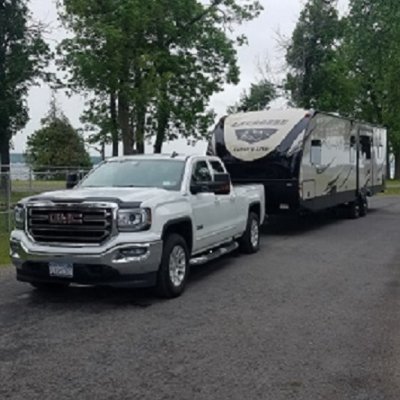sfelber9
Member
Hey everyone. Just returned from our first trip. Association Island KOA, Henderson NY. I'll get to that in another post for the review.
My main question is whether or not my TV tire pressures are too low. Through years of driving and sensing the vehicle around me, I think I have a good sense of what my truck is doing underneath me. I have made the mistake of overloading a truck or two and remembered that "Squishy" side to side feeling like the tires are low on air. It didn't dawn on me until after we got home and I was talking with the friends that were camping next to us. He said it looked like it was towing ok. We talked about how I felt that "squishy" feeling in my buttocks in the seat when driving. The topic of air pressure came up and I think that might be the verdict.
The tire pressure sensors that are built into the truck (GMC Sierra) showed me running around 39-40 psi when hauling the camper down the highway at speed.
The "cold" rating is 44psi.
Should I be at that before coupling to the trailer and traveling?
Will that "firm-up" the feeling in my "seat"?
Each time I felt it I was checking my mirror to see if the trailer was starting to sway, that's the sensation is was getting.
Could it be just the aerodynamics of the trailer behind me? 8 foot wide by 11 foot tall box on wheels. LOL.
We head back out next Friday for round 2. About an hours' drive on the NYS Thruway. Similar driving conditions as this past trip.
My main question is whether or not my TV tire pressures are too low. Through years of driving and sensing the vehicle around me, I think I have a good sense of what my truck is doing underneath me. I have made the mistake of overloading a truck or two and remembered that "Squishy" side to side feeling like the tires are low on air. It didn't dawn on me until after we got home and I was talking with the friends that were camping next to us. He said it looked like it was towing ok. We talked about how I felt that "squishy" feeling in my buttocks in the seat when driving. The topic of air pressure came up and I think that might be the verdict.
The tire pressure sensors that are built into the truck (GMC Sierra) showed me running around 39-40 psi when hauling the camper down the highway at speed.
The "cold" rating is 44psi.
Should I be at that before coupling to the trailer and traveling?
Will that "firm-up" the feeling in my "seat"?
Each time I felt it I was checking my mirror to see if the trailer was starting to sway, that's the sensation is was getting.
Could it be just the aerodynamics of the trailer behind me? 8 foot wide by 11 foot tall box on wheels. LOL.
We head back out next Friday for round 2. About an hours' drive on the NYS Thruway. Similar driving conditions as this past trip.

